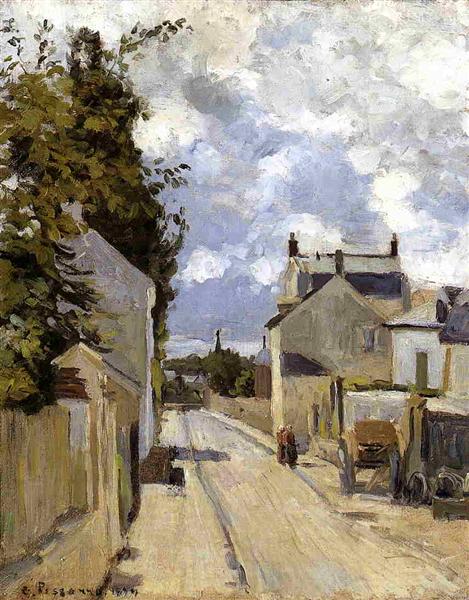Opis
Praca „The Calle del Heritage - Pontoise” (1874) Camille Pissarro jest żywe świadectwo opanowania impresjonizmu i głębokiego zainteresowania artysty w reprezentacji życia codziennego. Pissarro, jeden z rodziców założycieli impresjonistycznego ruchu, wyróżniał się jego zdolnością do przechwytywania światła i koloru w naturze i życiu miejskim, a ten obraz jest tego doskonałym przykładem. Położony w bukolicznym środowisku Pontoise, lud, w którym Pissarro powstał na kilka okresów swojego życia, praca ta odzwierciedla nie tylko jego środowisko, ale także zaangażowanie w eksperymenty techniczne i poszukiwanie autentycznego reprezentacji.
Skład pracy jest zasadniczo dynamiczny i poruszony, ułatwiając poczucie ruchu charakterystycznego dla impresjonistycznego podejścia. Poprzez szerokie widoczne pociągnięcia pędzla i niezwykłe użycie światła, Pissarro udaje się wywołać atmosferę żywego poranka na polu. Perspektywa ulicy, która jest przyciągana do tła, zachęca widza do wejścia w tę cichą i codzienną scenę, podczas gdy architektura skromnych domów po obu stronach drogi zapewnia poczucie intymności i znajomości. Cienie, które są konwencjonalnie, wraz z niuansami światła, które świecą na fasadach, ujawniają namiętne zainteresowanie artysty w interakcji światła i koloru, podstawowych elementów impresjonizmu.
Szczególnie godne uwagi jest użycie koloru na „Heritage Street”. Odcienie zielonych i brązowych dominują, przywołując uczucie żywej natury i należące do ziemi. Są one usiane akcentami białych i żółtych, które reprezentują światła filtrowane przez roślinność i budynki, tworząc kontrast, który daje żywotność kompozycji. Ta uważna, ostrożna i precyzyjna paleta podkreśla entuzjazm Pissarro dla reprezentacji życia naturalnego i wiejskiego, proponując widzowi intymną i osobistą wizję jego otoczenia.
Na całej ulicy, chociaż istnieje niewiele ludzkiej obecności, niektóre postacie można wyróżnić w oddali, które przyczyniają się do poczucia życia i ruchu. Te dyskretne przedstawienia mieszkańców Pontoise są świadectwem społecznego niepokoju czasu i wzmacniają związek Pissarro z ich społecznością. Włączenie tych postaci, anonimowych i niemal schematycznych, sugeruje zarówno codzienne życie miasta, jak i zamiar Pissarro, aby skupić uwagę widza na otaczającym krajobrazie.
Należy zauważyć, że w kontekście impresjonizmu Pissarro był pionierem w użyciu techniki „Plein Air”, która polegała na malowaniu na zewnątrz w celu uchwycenia światła i koloru w najczystszym stanie. „The Hermitage Street” jest reprezentacją tego podejścia, w którym naturalność i bezpośredniość doświadczenia wizualnego przejawiają się dzięki użyciu luźnych pociągnięć pędzla i intuicyjnego zastosowania kolorów.
Krótko mówiąc, „Heritage - Pontoise Street” to nie tylko dzieło, które rejestruje określony czas w czasie, ale także represencję impresjonizmu poprzez emocjonalną i obiektywną reprezentację środowiska, jego żywą atmosferę oraz opanowanie koloru i światła . Praca zachęca do roli światła w malowaniu i wieczności efemerycznej momentu, w którym jest inspirowana, co sprawia, że Camille Pissarro jest centralną postacią w historii sztuki współczesnej.
KUADROS ©, słynna farba na twojej ścianie.
Ręcznie wykonane obrazy olejne, z jakością profesjonalnych artystów i charakterystyczną pieczęcią KUADROS ©.
Usługa reprodukcji zdjęć z gwarancją satysfakcji. Jeśli nie jesteś w pełni zadowolony z repliki twojego obrazu, zwrócimy twoje pieniądze w 100%.

